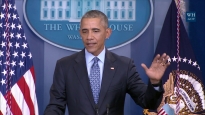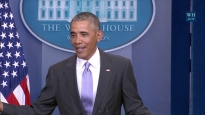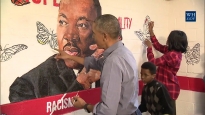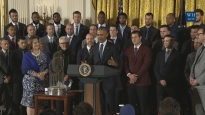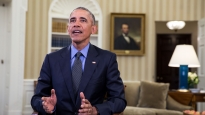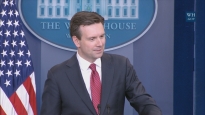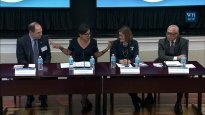The President and Vice President Meet with Newly Elected Mayors
December 13, 2013 | 5:56 | Public Domain
President Obama and Vice President Biden meet with a group of newly elected mayors from across the country to discuss the ways in which the Obama Administration can serve as an active partner on job creation and ensuring middle class families have a pathway to opportunity. This meeting builds on the Administration's unprecedented effort to partner with mayors who are working to implement policies that lead to high-paying, high-skill jobs in their communities.
Remarks by the President Before Meeting With Newly Elected Mayors
Roosevelt Room
2:20 P.M. EST
THE PRESIDENT: Well, it is a great pleasure to welcome not only some of the most outstanding mayors in the country, but also folks who are representing incredible cities, world-class cities, that are going to be central to America’s economic growth and progress for years to come.
I've always said that mayors don't have time to be ideological, and they don't really have time to be partisan, because they, every day, are held accountable for concretely delivering the services that people count on all across the country. And I think it’s for that reason that when we think about mayors, we think about folks who actually get stuff done.
This is an outstanding group of both mayors and mayors-elect, representing some of our largest cities. They have a shared vision of cities as being critical hubs in which we're creating jobs; bringing businesses; seeing startups develop; making sure that there are pathways, gateways for opportunity for people from the surrounding areas, the surrounding states, the regions, and in many cases, the world, because I think you’ve got a lot of immigrant populations that naturally gravitate towards the diversity and dynamism of the city.
And although we have seen terrific progress in our cities, as we have across the country over the last several years -- millions of jobs being created, the housing market starting to recover, businesses investing again, manufacturing making an extraordinary comeback -- what we know is we've still got a lot of work to do to deliver a vision that we all share, which is an America where if you work hard you can make it.
And what that means is, is that my hope and goal out of this meeting is we immediately set up a strong partnership with all the mayors here and all the mayors who aren't here where we get a clear sense of what their vision is and how they’re trying to deliver services; how we can make sure that our kids are getting the very best education possible; how we make sure that we are creating the platforms, the infrastructure for jobs to succeed -- or jobs to be created and businesses to succeed in these cities; how we make sure our transportation dollars are flowing in a way that maximizes economic development that hopefully reduces congestion and rush-hour traffic -- I suspect that's something that some of you have heard from your constituents about -- (laughter) -- how we make sure that there’s a strong social safety net there that is not a place where people stay over the long term but rather is a mechanism whereby people who have had some bad luck can get back on their feet and get back into the workforce.
So I'm very much looking forward to the conversation. In the meantime, at the federal level, there’s some things that we can do to help mayors. If we, in fact, can get this budget deal completed and out of the Senate, we can get away for the first time in a couple of years from the constant brinksmanship and crisis governance that we've seen up on Capitol Hill that impedes growth and makes businesses and investors less certain about wanting to put their money in. So that would be an important achievement and that's something the federal government can do to help make.
One element that's not in this budget that needs to be passed right away is UI -- unemployment insurance. You’ve got potentially 1.3 million people who, during Christmastime, are going to lose their unemployment benefits, at a time when it’s still very difficult for a lot of folks to find a job. And that's not just bad for those individuals and for those families, that's bad for our economy and that's bad for our cities, because if they don't have the money to pay the rent or be able to buy food for their families, that has an impact on demand and businesses and it can have a depressive effect generally. In fact, what we know is the economists have said failing to extend unemployment benefits is going to have a drag on economic growth for next year.
So there are some basic things that we can do just to create a better economic environment for these outstanding mayors. There are some areas -- for example, raising the minimum wage -- that could have a tremendous boost in a lot of the cities where there are a lot of service workers who get up and do some of the critical work for all of us every single day but oftentimes still find themselves just barely above poverty or, in some cases, below poverty.
So what I want to do is explore ideas with them. We wish them luck. You can see that it’s a diverse group, but what binds them together is a commitment to helping people succeed in this country.
And so I want to congratulate all of them and I'm looking forward to, over the next three years for me, working with them for the benefit of their constituencies. Many of them may end up being around for 20 years and -- (laughter) -- so they’ll have other Presidents to work with.
But thank you so much for coming in.
END
2:27 P.M. EST
|
January 18, 2017
|
January 17, 2017
|
January 16, 2017
|
January 16, 2017
|
|
January 14, 2017
|
January 13, 2017
|
January 13, 2017
|
January 12, 2017
|
